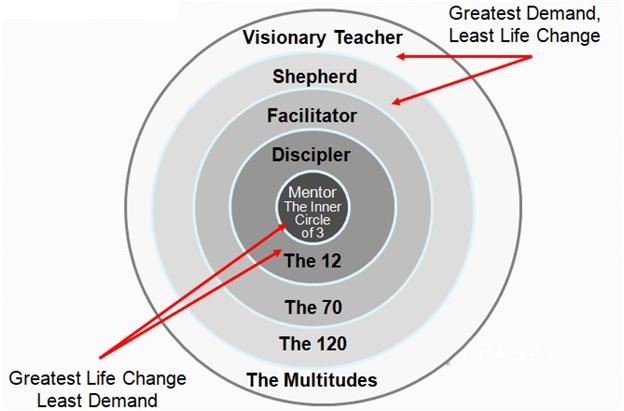Logic says that Jesus should have spent the vast majority of his time concentrating on the crowds. After all, he was only going to be on earth for a short time, and the masses had so many needs. Yet of the five hundred + verses in Mark that record Christ’s ministry, 50 percent show Jesus relating to the public, while 50 percent illustrate his working with His disciples. Why would Jesus spend so much time with a few disciples? Even within the group of twelve, he gave more attention to James, Peter, and John. Jesus spent His time in the following ways because He needed to focus His time on the future not the present. The following diagram not only outlines the breakdown of His time but also highlights demand and life change issues.

Diagram by Bob Logan and Neil Cole (used with permission)
Jesus was a:
- Visionary teacher – He taught the crowds that followed him
- Shepherd – He cared for the wider group of followers
- Facilitator – He coordinated ministry journeys
- Discipler – He chose a core group to deposit the Gospel
- Mentor – He selected an inner group to be the future leaders
This is how we should allocate our time today. The essence of discipling a few to start with proved to be the most productive approach for those who followed.
It seems many leaders are not aware of what He did or don’t follow this model. Unlike Jesus, they concentrate on the crowd rather than developing disciples and mentoring leaders who are disciple-makers. Many pastors spend their time preparing their sermon for those hearers who come on Sunday. The problem is that disciples are not primarily formed through hearing a message. Other pastors prioritise counselling those who come through the church doors. Counselling, like preaching, is important. The problem is dependency without ministry extension. In fact, the two are connected. Because the pastor often creates a dependency on himself, he is not able to develop others who will develop others.
Jesus wasn’t confused about what the Father had sent Him to do and where he should spend most of his ministry time.The only way for a leader to go beyond themselves is to follow the pattern of Jesus: concentrate on discipling and making disciple-makers who will then become disciple-makers. The question is “Where do you spend your limited time?”
